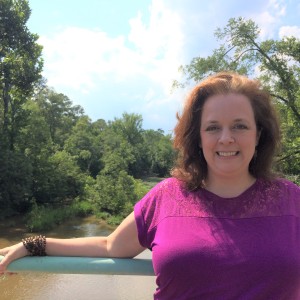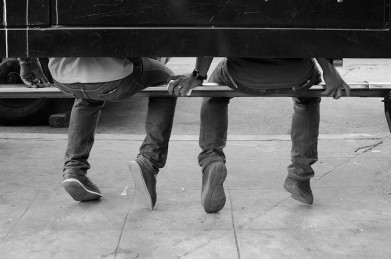 Over the past few months, a precious person has come closer into my family’s life in such a way that their presence in my home, among my loved ones, has come to feel natural and easy. This is someone I love, someone who adores my children and appreciates my partner of 18 years and whose sweet spirit and vibrant laughter have added joy and mirth to our family home.
Over the past few months, a precious person has come closer into my family’s life in such a way that their presence in my home, among my loved ones, has come to feel natural and easy. This is someone I love, someone who adores my children and appreciates my partner of 18 years and whose sweet spirit and vibrant laughter have added joy and mirth to our family home.
Yesterday, they rode with me to drop my freshly-mohawked teenager off at a farm to help with preparations for an upcoming arts camp. I introduced them by name to the camp assistant and walked over to chat with the camp director for a bit. Later, as we got back into the car to head to lunch, I asked what they thought of the farm.
“It was nice,” they said. “I’m glad your children have a place like that. Also, while I was chatting with the camp assistant, she asked if I was family.”
“What did you say?”
“I said yes.”
They weren’t wrong.
The meaning the word “family” holds for me is something I’ve given much consideration over the years. For generations, many of us have been expected to turn a blind eye to the ways patriarchal domination of women’s and children’s bodies perpetuates abuse in our own family systems. My inability to sweep these abuses under the carpet, to keep silence and pretend all is well, has led to my estrangement from one entire side of my family. It’s an estrangement I feel will be permanent, and while I grieve the loss of an ideal I never had, I welcome the opportunity to live authentically and boldly, confident in my dedication to my ideals, which include honesty, justice, and the unconditional protection of children and vulnerable populations.
For a while, I sat with the gap this estrangement created in my life, unwilling to fill it with harmful relationships with those to whom I am blood-related, yet hesitant to broadly redefine it in a way that negates the importance of those who have chosen to love and raise up a child, however imperfectly. Raising my own children, I’ve made a more than a few mistakes — I react, I mess things up, I fall short. I apologize… a lot. I don’t ever want my children to look back at my own estrangement, my own re-visioning of “family,” and see it as minimizing the importance I place on my relationships with them. At the same time, those of us whose families of origin are unable to show up for us fully and unconditionally, whether it is through absence, abuse, or simply not being able to accept parts of our lives and our stories, deserve to create spaces and social networks in which we feel wholly loved, always accepted, and tenderly supported.
This is a social and psychological necessity; humans are social creatures, not meant to live in isolation. The fundamental nature of our existence is interdependence, both with the other humans in our spheres — those like and unlike us — as well as with the ecological web in which we find ourselves and its constituent animals and plants and processes. Amped-up, hyper-masculine models of “independence” in which bootstrapping your way through life without help is the only acceptable way to have your own strength, wisdom, and maturity honored? These models emerge from a Western construct that has been developed and honed to justify centuries of disruption of families and communities in the name of colonial expansion, slavery, and unrestricted, toxic capitalism.
Last year, Kate Brunner wrote about her understanding of what makes a matriarchal society, saying: “The underlying ethos of a matriarchal society is one that prioritizes care-taking and peacemaking within a context that respects and values the innate capabilities and inherent worth of its members and its environment; balancing the realities of different genders and generations as it does so… A matriarchy does not simply swap men for women when it comes to who’s in charge and women for men for who’s supposed to shut up and take it. A matriarchy revisions community structure completely, bringing the focus down to the clan, instead of up to the community leader.”
In my spiritual understanding, we are each made of the same substance — each tangible, physical expressions of a single divine reality. Harm to one creates harm to all, and our well-being is intertwined with each other’s, just as it is with the well-being of our communities, ecosystems, and planet. There is no grace in failing to step up for others in their times of struggles, no shame in allowing others to step up for us in our own challenging times, and no wisdom in refusing to reach out when we are, on the deepest levels of our being, craving connection and needing encouragement. We are meant to support each other in a continual exchange of love and tenderness, a perpetual flow of grace that models and expresses sacred compassion and divine love.

“Family” is broad; it is not without meaning. Not all of our networks of support and encouragement would be considered “family.” I have intimate networks of friends with whom I share love and affection and dialogue who would not be considered family. I have people with whom I share fewer details of my life and thinking who I do consider to be family. How to understand “chosen family” is something each of us must figure out for ourselves, and our definitions may differ.
Unconditional love and acceptance; setting boundaries with compassion, intention, and wisdom; and being willing to show up for our chosen family in times of challenge as well as times of joy — these are parts of my definition, but not its whole. It’s something intangible, indefinable, but inextricably bound up in my “same substance” cosmology and conviction of our spiritual interdependence.


good article
LikeLike
I don’t consider myself a feminist, but I truly enjoyed your writing. I think I could talk to you about life for hours! I love your outlook on interdependence and the need to surround ourselves with people who honor and love us unconditionally. My deepest bonds are with my immediate family, but there are friends who have become this to us as well. I look forward to reading more of your insights.
LikeLike
My deepest bonds are also definitely with those in my immediate family circle, who share space with me daily. Thanks for reading!
LikeLike
Amen, sister!
LikeLike
What a lovely post about your family. However, what about this new person? Male? Female? Why are you hiding this person’s identify? You leave a window open to all sorts of speculations about this person.
LikeLike
Hi, Barbara! This is a dear friend who identifies as nonbinary in terms of gender, so that’s why the nonspecific on the pronouns. I was less intending to hide their identity, and more hoping to keep the focus on the fluidity of family by not labeling as “friend,” “aunt/uncle,” or trying to otherwise find a pre-existing box to fit them into. “Precious person” or “loved one” captures that more-family-than-friend vibe without boxing them in. Similarly, I have a friend who now lives in Cambridge, MA, who is chosen family, but fluctuates somewhere between brother and cousin and friend to me, uncle/friend to my kids. It’s the fluidity that captures my interest, and the ways in which we don’t have words for those kinds of relationships in our culture.
LikeLiked by 2 people
I can connect with your reflection on establishing boundaries as needed while affirming the core role that relationships play in our lives. As someone who deals with family estrangement, I’ve always framed the dynamic as one related to independence and dependence on others. As I’ve worked on my upcoming writing, I’ve found myself shifting paradigms to considering relationship with self and relationship with others. Both are vital and interwoven; I think healthy relationships with others blossom from deep understanding of self, and vice versa.
LikeLike
I like framing this in terms of relationship to self and relationship to others — we have to preserve and protect our relationship with ourselves — our health, safety, and spiritual growth — even as we balance and navigate relationship with others. Thanks for the comment!
LikeLiked by 2 people
What a wonderful post, Christy!
LikeLiked by 1 person
Thank you for this post Christy. I like to talk about self in community, where knowing self and the other(s) cycles and spirals so I loved reading how you see it. Your words add to my understanding. I value your courage that you can say your failings as a parent as well as your successes. I say that as a mother and grandmother where I live with myself that way, as a survivor of domestic and family violence. As a lesbian, now 66 years of age and living in Australia, I learned the hard way that biological connections do not necessarily make family. Rather other shared values like love and respect. Much food for thought here. Again thank you.
LikeLiked by 1 person
Thanks for these thoughts! I also believe that shared values like love and respect go a long way. I was talking to a friend about this recently — about what “family” means — and we were agreeing that it’s about a willingness to show up for each other, to love each other, and to not give up on each other. Those are important values for me too, balanced with healthy boundaries and compassion.
LikeLiked by 1 person
I found your essay to be so rich, so touching, and so valuable & caring, that I had to share it with friends & family. My sister, Lynne, responded that, “This is the society that Jesus knew we could have. It is the Kin-dom of God.”
The only difficulty that I had with your essay was with the word “matriarchy”. For me, since the word itself has “archy” in , Though I agree with the way in which Kate Brunner envisions matriarchy, it seems too gender bound. The word tends to call up a unsavory images for me.
LikeLiked by 1 person
I also have difficulty with the word matriarchy. I think it is not uncommon when we think about the experience of the word patriarchy, and then the problem always defining matriarchy. I just cannot remember the name of the author who introduced me to the word matristic or another one is matrifocus. Can’t remember where I first read that word either. They do focus us on the healing and caring values traditionally associated with women.
LikeLike
Anthropologists also use the word matrllocal, if the husband goes to live with the wife’s family.
LikeLike